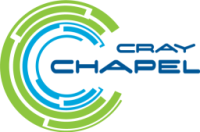FAQ¶
Frequently Asked Questions
I am interested in Chapel as a Google Summer of Code student, where do I start?
See the How to Apply section. It describes the steps you will need to take in order to have a successful application.
When are peak hours for the chapel-summer-of-code Gitter channel and Chapel Gitter channel?
The core Chapel developers are primarily located in the US, so your chances of finding a developer on the channel are highest during weekday work hours of Pacific through Eastern timezones. This is approximately 06:00 - 18:00 Pacific Time.
I want to start working on the compiler! Where do I start?
Slow down young grasshopper. Before you run, you must first learn to walk. You should begin your journey at the Contributing page.
I’ve read the documentation on platform support and can’t find Windows anywhere.
At this stage in Chapel’s development, Windows is not officially supported natively. Chapel does work well under the Windows Subsystem for Linux (WSL) and it’s also possible to use it under Cygwin. However for most GSoC development efforts we would recommend using WSL, a VM, or finding a Linux machine you can SSH to.
If you are Windows enthusiast interested in improving the situation, you might be interested in submitting a project proposal for improving Windows support.
How many students will Chapel be accepting this summer?
The number of students we are able to accept is not yet known at this point. For reference, Chapel accepted the following numbers in past years:
GSoC 2016: 2
GSoC 2017: 4
GSoC 2019: 4
Which projects are highest priority?
Project priority/impact will not be a factor in the proposal evaluation process. Students will not be at any disadvantage for proposing a project that is not listed on the Project Ideas List, but in order to be considered they will need to discuss the idea with developers and identify a willing mentor for their project idea before pursuing it in their project proposal.
What is the process for submitting an original project idea?
Original project ideas should be discussed with developers before submitting a proposal. The goal of these discussions is to:
Determine if the project is viable for GSoC
Identify potential mentor(s) for the project
If nobody is willing to mentor such a project, it will not be selected.
What does the project difficulty rating mean?
Each project’s difficulty has been rated on a 1-7 point scale. This scale correlates with the expectations from the student during the application period and throughout the summer. For example, a 7/7 project may be more appropriate for a graduate student or highly driven undergraduate.
What factors should be taken into consideration when choosing projects?
Some projects receive higher interest from students than others, meaning there may be greater competition for some projects over others. You can get an idea of the interest for a given project by browsing the mailing list or hanging out in the chapel-summer-of-code Gitter channel.
No mentor will be able to take more than one project as a primary mentor. This may affect the projects we are able to accept.
With these previous caveats in mind, the primary motivating factor in deciding what you work on should be your interest in the project.
Do I have to do project-specific contributions as part of the application process?
There is a lot of value in good interactions and contributions. Sometimes a student can demonstrate ability with a particular project by getting started with it, but not all the students accepted in the past used that approach.
It ultimately depends on the project: is the project really challenging or requiring specific background knowledge? In those cases getting started can help demonstrate that you’ll be able to make progress. For other projects, it might be better showing you can make progress on contributions.
Who is involved in selecting the students for GSoC?
Students are selected through a process involving all GSoC mentors and backup mentors.
